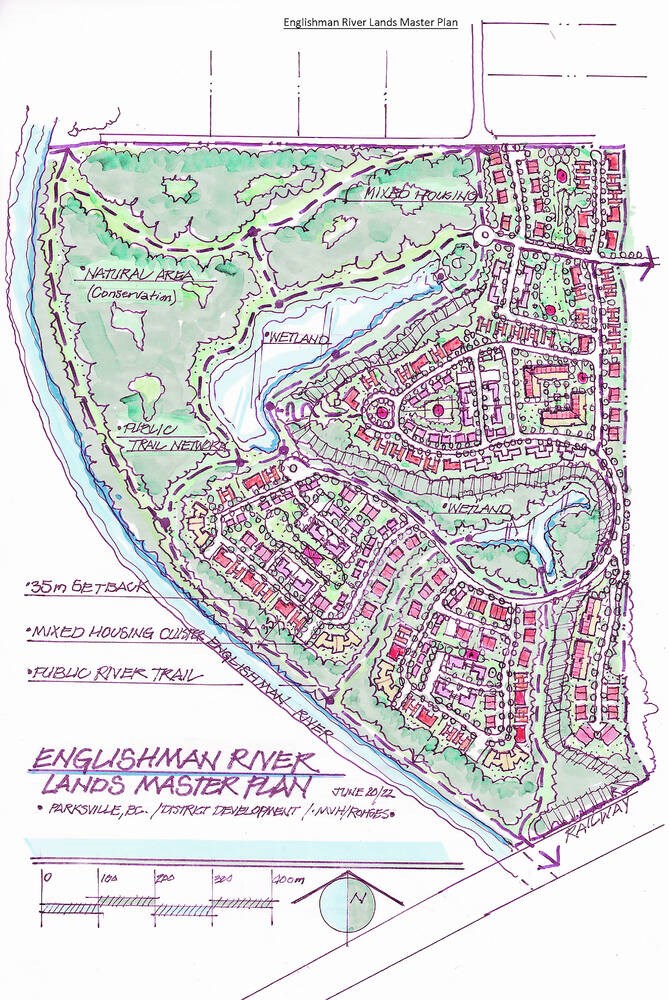A public hearing is coming up next month into a proposed 800-unit development with a mixture of multi-family housing on land in Parksville partly bordered by the Englishman River.
District Developments of Vancouver is seeking official community plan and development bylaw amendments to allow it to build south of the city under a comprehensive development zone. The site of about 140 acres would be split between development and parkland and as a setback from the river.
The public hearing for 1465 Greig Rd. is set for Sept. 19 at 6 p.m.
Riverside would not have any single-family homes but would go in a more relevant direction, Mike Nygren, District’s vice-president of development, told council.
The developer wants to put in duplexes, four-, six- and eight-plexes, townhomes, four-storey apartment buildings and three-storey walk ups without elevators. The diverse mix of housing would be suited to different socio-economic levels, family arrangements and income levels to bring an “affordability metric” into the project, said Brandon Crema, District executive vice-president.
It would be both rental and market housing.
About 50 to 80 homes would be developed per year, Nygren said.
District is also proposing 100 units of assisted living for seniors in its allowed uses, along with neighbourhood commercial space.
Much of the land, once used as a gravel pit, is forested. A couple of areas that form into wetlands during heavy rains would be preserved. District has agreed to formalize an agreement to protect the flood plain.
The project is being developed to withstand a 500-year flood level, Nygren said.
Studies on water and sanitary sewers showed that there is enough capacity for both, he said.
A traffic analysis found that impact on the highway would be “benign,” he said.
Kevin Foster, District vice-president of development, said the company would formalize commitments for the rental housing component, flood plain protection and greenspace. It would contribute $1,600 per unit, which could eventually top $1 million, requested by the Parksville Fire Department to offset costs in the growing community.
Traffic impact will be reviewed with the city and adjustments will be made if appropriate, he said.
Crema said the company hopes to work with the Nature Trust of B.C. or the Nature Conservancy of Canada on preserving greenspace.
Coun. Doug O’Brien recommended District work with environmental groups to help bring salmon back to the river. Crema said the company has spoken to organizations and has been told to stay away from the river to allow it to regenerate itself.
O’Brien also said the existing trails on the site have not been properly designed and some are in locations detrimental to the environment. Crema agreed, saying some trails are in the middle of the site and well-located while others go along the river where vegetation has been trampled and some of the bank has fallen away.
The plan is to rehabilitate trails and separate ecologically sensitive areas and do the work over time, Crema said.
Crema told council that District does not own the development site. District has a long-term option to buy the property which comes into effect once the first 10 acres are subdivided. “And then we have further options to buy the rest of the property.”
Parksville resident Kristine Masuch, who belongs to two local environmental groups, is concerned about the proposal’s potential impacts.
She said she is not against higher densities or housing development, but they belong within cities not on land outside of Parksville’s core.
People should be able to walk to most of their shops and services within 15 minutes, but that would not be the case here, she said.
Masuch questioned adding another 1,000 or so vehicles to the roads at a time of climate change. Riverside would bring more traffic onto the “already busy” highway nearby, she said.
She is also concerned that a wildlife corridor would be lost on land where many trees are growing.
>>> To comment on this article, write a letter to the editor: [email protected]



